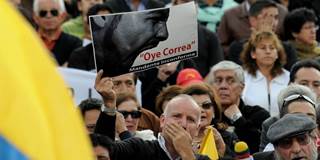For more than a decade, Ecuadorian journalists have increasingly felt the effects of repressive media and speech laws that were supposedly enacted in the "public interest." As other countries consider regulations to combat misinformation, the public and policymakers must understand how even well-meaning efforts can go badly wrong.
QUITO – To understand the possible consequences of US President Donald Trump’s constant denunciations of the press, one need look no further than Ecuador, where former President Rafael Correa’s government attacked the news media for years. During his 2007-2017 presidency, Correa implemented a raft of measures aimed at stifling press freedom. And, like Trump, he regularly used the media as a whipping boy to rally his supporters.

QUITO – To understand the possible consequences of US President Donald Trump’s constant denunciations of the press, one need look no further than Ecuador, where former President Rafael Correa’s government attacked the news media for years. During his 2007-2017 presidency, Correa implemented a raft of measures aimed at stifling press freedom. And, like Trump, he regularly used the media as a whipping boy to rally his supporters.